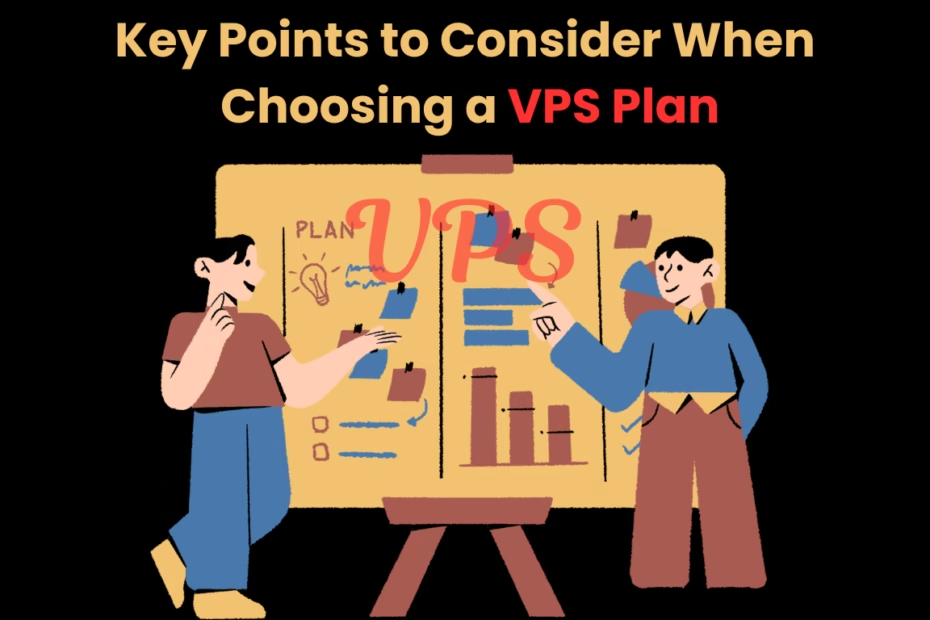Key Points to Consider When Choosing a VPS Plan
Picking the right Virtual Private Server (VPS) plan is challenging. There are a large number of service providers and a variety of options available. Not choosing the right VPS hosting service provider leads to inappropriate IT infrastructure. You must choose a web hosting service provider that perfectly aligns with your requirements and budget. Also, you must look for features like VPS with cPanel.
Understanding your specific requirements is paramount before diving into the VPS web hosting plans. Different factors like the type of websites or applications you host. Whether you are launching a simple blog, a resource-intensive eCommerce platform, or the best Windows VPS server? Each of the scenarios requests a different level of resources and features. Such initial evaluation will be the foundation for selecting the appropriate VPS plans and providers. In this guide, there are key points to consider while choosing a plan.
Crucial Pointers to Consider While Choosing VPS Hosting Plan
-
Processing Power and RAM
The core performance of your VPS depends on the CPU processing power and Random Access Memory (RAM). These two components directly impact the speed and responsiveness of your applications and websites. A higher CPU core count and clock speed translate to faster processing capabilities, enabling your server to handle more concurrent requests efficiently.
Likewise, ample RAM size facilitates smooth operation, without bottlenecks, and apps will certainly run without lag. Think about how many resources your applications need. Where a video editing platform is concerned, it’ll need significantly more CPU and RAM as compared to a simple static website. Don’t think these core components aren’t significant pieces of your VPS staff. A plan picked with insufficient resources will result in slow loading times, app crashes, and a bad user experience.
-
Storage Capacity and Type
Storage capacity determines how much data your VPS can hold. It includes the website files, databases, and other essential data. Look at whether your current and projected storage requirements are met or not. Will you be storing large media files, databases, or simply website files? This is important, if you run out of storage space, you can suffer downtime and data loss. The type of storage also matters, beyond capacity.
Read and write speeds on Solid State Drives (SSD) are way faster than Hard Disk Drives (HDD). Because SSDs have really quick access times, they are ideal for use by databases and structures that require quick access to data, like frequently accessed website files. They are more affordable than the HDDs but their slower speeds can adversely affect performance. Consider weighing the cost-performance trade-off about your application requirements.
-
Bandwidth
Bandwidth refers to the amount of transferred data from one VPS to another through a given period. If your website is handling significant traffic. Insufficient bandwidth will lead to slow loading times, connection errors, and a frustrating user experience. Think about how much traffic you will have, and what will be uploaded or downloaded by your users.
Choose a plan with enough bandwidth if you anticipate it will be heavily trafficked. Curiously, you should monitor your bandwidth usage very closely, because if you cross your allocated limit, you may be charged extra or there may be service disruptions. Making sure that you have accurate bandwidth planning so you can maintain a positive user experience and avoid unknown expenses is critical.
-
Operating System and Control Panel
Your VPS environment is built on top of the operating system (OS). Mostly, Linux distributions are popular for example you’ve got Ubuntu, CentOS, and Debian just to name a few; have their own pros and cons. Think about if you are familiar with different OSs and what are the basic needs your applications need. Certain OSs may only support some applications.
Server management becomes easy with a control panel like cPanel or Plesk, where users can do tasks like create databases, make changes in files, or install software on the server using an easy-to-use interface. Control panels do save a lot of comfort but can also entail a price. Decide whether the extra expense added convenience justifies the cost based on your technical skill as well as management needs.
Read More: Incredible benefits of VPS hosting
Conclusion
Selecting the right VPS plan requires careful consideration of several factors, from processing power and storage to bandwidth and security. If you perfectly evaluate the requirements and compare different providers and plans, you will get the perfect fit for your project. Let not them forget that a decently picked VPS is the cornerstone of a successful online presence. Don’t rush the choice, research, compare options, and make the choice that will be right for your long-term success.
Searching for the right VPS is an important formative step of your online journey. When you take the time to consider the points in detail outlined above and utilize the resources from reputable providers like MilesWeb. They have an excellent IT infrastructure with SSD NVMe storage, unmetered bandwidth, global data center choice, and 99.9% uptime.

